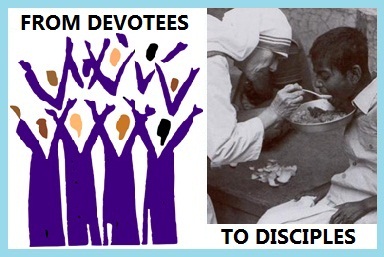 Veneration and adoration are the products of inculturation and contextualization. They are undoubtedly desirable, useful and essential to relate with strangers to the Good News as well as for keeping the faith alive through generations. But if we’ve understood it rightly, the practice caters to the culture, aspirations and mindset of the simple and nascent entrants to faith. At any point in time they are invariably the target audience for the Good News and obviously there is a need to speak the language they understand. However, it is also a pastoral responsibility not to allow spiritual stagnation but encourage the faithful to rise higher and learn to worship in spirit and truth. Sometimes, during festive Novenas it is really good to hear a priest remind the faithful that God seeks disciples and NOT devotees.
Veneration and adoration are the products of inculturation and contextualization. They are undoubtedly desirable, useful and essential to relate with strangers to the Good News as well as for keeping the faith alive through generations. But if we’ve understood it rightly, the practice caters to the culture, aspirations and mindset of the simple and nascent entrants to faith. At any point in time they are invariably the target audience for the Good News and obviously there is a need to speak the language they understand. However, it is also a pastoral responsibility not to allow spiritual stagnation but encourage the faithful to rise higher and learn to worship in spirit and truth. Sometimes, during festive Novenas it is really good to hear a priest remind the faithful that God seeks disciples and NOT devotees.
It is truly right to give thanks and praise to God always for His amazing power and glory; but the thing to be bowed to, is His Will and that which is to be adored, desired and imitated is His selfless love. Others may understand Church teaching as it suits them but this is my understanding: Church DOES NOT exhort us to imitate either the Father or the Holy Spirit but it does unceasingly exhort and teach us to imitate Christ Who is the image of the unseen God.
If you are still confused about it just check if you understand hero-worship, then true worship too, will become clear: a youth may praise and thank Michael Jackson for his awesome performance and also admit that he is incomparably the best; but hero-worship lies in imitating Michael Jackson’s style and that’s how his fans show their love and admiration for him. God’s style is the sacrificial, selfless love called Agape and He says: “Whoever wants to be my disciple must deny themselves and take up their cross and follow me” (NIV Mt 16:24b).

